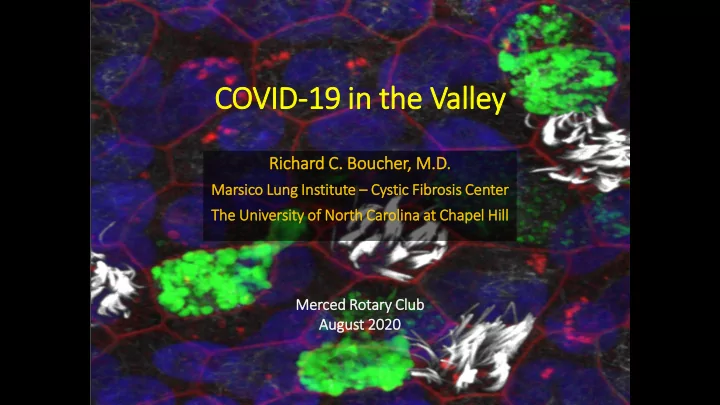

COVID-19 in the Valley Ric ichard C. . Boucher, M.D .D. Mar arsic ico Lung ung Ins Instit itute – Cystic ic Fib Fibrosis is Cen enter Th The e Univ niversit ity of of Nor orth Car arolin ina at t Cha hapel l Hill ill Mer erced Rot otary ry Clu lub Aug ugust t 2020
SARS-CoV-2: A Key (Spike Protein) and Lock (ACE2) Infectious Mechanism Produces COVID-19 A B Fischetti et al, Scientific American, 2020 Berkeley Lights, 2020
What Normally Protects Us against Vir iruses? Mucus. Mucus Mucus Layer composition: 98% Water PCL 0.9% Salt 0.7% Globular proteins Cells 0.4% Mucins MUC5AC MUC5B Overlay Ehre/Biogels.MIT.edu
SARS-CoV- 2: Extraordinarily “Smart” Virus ✓ Penetrates mucus ✓ Attacks prevalent cell Attacks high abundance receptor ✓ ✓ Shuts down host defense Created with BioRender.com
How We Acquire COVID-19 Nasal and Lung Infections Hou et al, Cell, 2020
The Target (A (ACE2) Profile in in the Human Respiratory ry Tract Fig. 4 F A B E ACE2 TMPRSS2 Nasal epithelium A Nasal epithelium i ii iii ACE2 ACE2 ACE2 Trachea FOXJ1 FOXJ1 MUC5B Bronchi v iv Relative expression Bronchiole ACE2 ACE2 FOXJ1 MUC5B Alveoli vi vii Alveoli ACE2 HOPX SFTPC ACE2 F ) E Hou et al, Cell, 2020 ) )
Human Nasal Mucosa (Epithelium) Is the Most Fertile Ground for SARS-CoV-2 Infection HNE LAE SAE AT2-like AT1-like A B i ii iv iii v vi C
Ciliated Cell Is the SARS-CoV-2 Target in Human Nasal Epithelium C icSARS-CoV-2-GFP infected HNE
Loss of f Smell in in COVID-19 19: U Unfortunately Reflects Dir irect In Infection of f Olf lfactory ry Cells
How We Acquire COVID-19 Nasal and Lung Infections Hou et al, Cell, 2020
The SARS-CoV-2 Infected Human Lung, Part I SARS-CoV-2 SARS-CoV-2 A H&E sense iv iv iii i ii B SARS-CoV-2 SARS-CoV-2 α -Tub ii i SARS-CoV-2 MUC5B SARS-CoV-2 MUC5AC iii iv
The Cause of f COVID-19 Shortness of f Breath: In Infection and Loss of f Key Lung Cell Type Control
We Are All Different: Differential Infectivity of Human Airway Epithelium D icSARS-CoV-2-GFP infected LAE at 72hpi Donor 1 Donor 2 Donor 3 Donor 4 Donor 5 i GFP cilia staining i iii E ii
SARS-CoV-2 Infecting Human Airway Epithelia: The Numbers Game Is Not on Our Side! Ehre, NEJM, In Press
How Is Is SARS-CoV-2 Transmitted: The Worst Way, Small Aerosol Part rticles Close-Range Long-Range Only (< 2 m) (> 2 m)
WHAT Is “Small”?
“Small” Referenced to Things We Know
How Do We Produce These In Infectious Aerosols? Morowska et al, J Aerosol Sci, 2009
Im Important Lessons The Givens: • Wear a mask – test/trace/isolate • Maintain distance – fewer people (reduces potential total source) • Do not linger • Outdoors is safer than indoors Aerosol Transmission Suggests: • CDC “exposed” definition (> 15 min within 6 feet) is not adequate • COVID patients can infect family members when recovering at home? • Plexiglass shields only protect against droplets, not aerosols Save singing for the shower : )
Cover Your Nose: E Even If If You Are the Next xt Pri rime Min inister of f Germany!
How Good Are Mask Materials?
Candidate Vaccine: Novel and Traditional Approaches 1. Moderna: mRNA 2. Roche/Oxford: Adenovirus DNA 3. China/Russia: Protein (spike) µ Vaccine C icSARS-CoV-nLuc A A B Candidates 1 S230 100 100 2 % Neutralization S230.15 % Neutralization % Neutralization % Neutralization Pre-Immune MERS-27 3 S227.9 Immune m336 4 MERS-27 EDE1-C10 50 5 m336 50 6 EDE1-C10 0 0 -3 -2 -1 0 1 2 -3 -2 -1 0 1 2 (Log µ g/ml) (Log µ g/ml) (Log 10 ) Test Survey (Log 10 ) Test Survey Hou et al, Cell, 2020 µ µ µ
THANK YOU!
richard_boucher@med.unc.edu
Recommend
More recommend